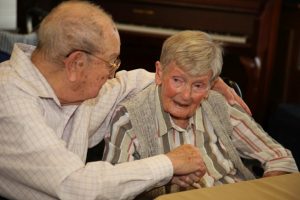Volunteering is associated with mental well-being, particularly in older adults. Yet we persist in doing things to and for residents, providing a steady diet of light social events, taking away opportunities for them to contribute, to give back. I argue that by providing cruise ship living as a model of care, we are missing the boat (so to speak), and I’m not the only one who thinks so.
Cruise ship living
 Cruise ship living in residential care refers to the model of living similar to being on a continuous vacation—a place where you are provided with ongoing entertainment and endless amenities. According to McCann (2013), this model it lacks opportunities for, and hinders, meaningful connections and personal growth.1
Cruise ship living in residential care refers to the model of living similar to being on a continuous vacation—a place where you are provided with ongoing entertainment and endless amenities. According to McCann (2013), this model it lacks opportunities for, and hinders, meaningful connections and personal growth.1
I had the pleasure of attending a recent session at the LeadingAge Conference in Indianapolis called Redefining Retirement: Creating Purposeful Living Communities. Steve Moran was one of the presenters and he had a similar argument to McCann. He wrote about this in his article “Hotel, Home or Cruise Ship” 2:
“Maybe, I have this completely wrong or maybe I am a bit jaded because I stay in a lot of very nice hotels every year, but I am just not sure that I—or most people for that matter—would really prefer to live out the last years of our lives in a hotel, no matter how big the suite or fancy the dining options or luxurious the common spaces. Nor would I want to live out the last years of my life on a cruise ship.”
I agree with Steve. I wouldn’t either. One of the things Margaret Wylde of ProMatura points out in the article, is the most important factor senior living residents associate with satisfaction, is how much they feel at home.
Being at the receiving end of services does not equate with well-being in a home environment over a long period of time. At my home we all pitch in—even the dog. We all do our bit and contribute what we can to maintain our happy home. OK, well the dog doesn’t actually do anything except take us out for regular walks, but we consider that a significant contribution.
Giving to others, volunteering, contributing back to your home and community is associated with well-being, particularly in older adults.3
Urgent action needed
Robyn Stone, DrPH, executive director of Leading Age Center for Applied Research, co-authored a paper called “Preparing for Better Health and Health Care for an Aging Population”, as part of a 4 new vital directions initiative of the National Academy of Medicine.4 None of these directions involves increasing amenities and cruise ship like services. Quite the contrary!
One of these vital directions focuses on increasing social engagement and fostering volunteerism in older adults. The other three include developing new models of care delivery, augmenting the eldercare workforce and transforming care for end of life.
‘A volunteer prescription’?
If that wasn’t enough to convince you, another recent study published in the Journal of American Geriatrics Society, found that older adults who volunteered regularly reduced their changes of developing cognitive problems by 27%.3 Twenty seven percent???!!!..those are tremendous odds. Furthermore, additional benefits include better emotional and physical health and a longer life. Sign me up. The authors recommend that staff consider ‘prescribing’ volunteering for those in their care.
Urgent action is needed to focus our efforts on better health and health care, but I’m pretty sure it doesn’t involve providing more amenities for elders. So please don’t book me on a cruise for my last years. I suspect I’d like it for 2 weeks and then would seriously want to abandon ship.
Submitted by Kristine Theurer,
PhD Candidate, University of British Columbia, Founder, Java Group Programs.
References
1Moran, S. 2016. Hotel, Home or Cruise Ship. Retrieved from https://www.seniorhousingforum.net/blog/2016/7/25/hotel-home-or-cruise-ship?pmc=MC&MyID=kristine%40JavaGP.com
2McCann, M. (2013). A culture of life enrichment: Beyond “Cruise Ship Living”, in LeadingAge Magazine. Washington, DC: LeadingAge.
3Tabassum, F., Mohan, J. & Smith, P. (2016) Association of volunteering with mental well-being: A life course analysis of a national population-based longitudinal study in the UK. British Medical Journal. Doi:10.1136/bmjopen-2016-011327
4Stone, R., Rowe, J.W., Berman, L.F., Fried, L.P., Fulmer, T.T.,& Jackson, J.S. 2016. Preparing for Better Health and Health Care for an Aging Population.
